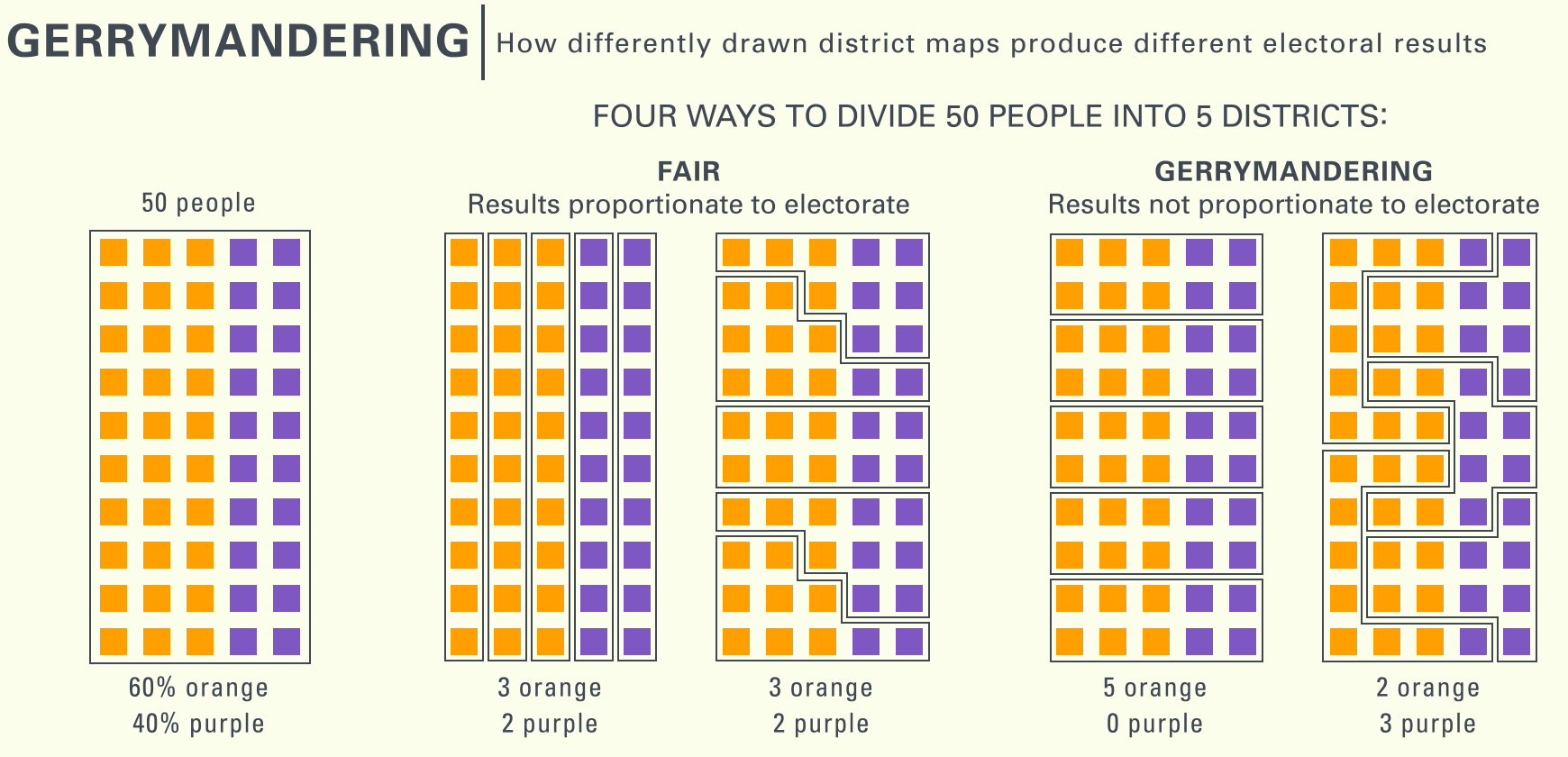Indian Polity
Gerrymandering & US Democracy
- 30 Nov 2021
- 6 min read
Why in News
Recently, the 2020 census results of the US population were presented. Following this, the exercise of Gerrymandering has been conducted across the U.S. Congressional and State legislative districts every decade.
- Gerrymandering or redistricting is the process of redrawing electoral boundaries. However, this exercise has been criticised for undermining democracy in the US.
Key Points
- Background: Gerrymandering, the term is derived from the name of Gov. Elbridge Gerry of Massachusetts, whose administration enacted a law in 1812 defining new state senatorial districts.
- Underlying Principle: The principle behind redistricting is to ensure that the election of public officials embodies the ideal of genuine democratic representation, by factoring in changes in the geographic distribution of population.
- Undermining Democracy: A basic objection to gerrymandering of any kind is that it tends to violate two tenets of electoral apportionment—compactness and equality of size of constituencies.
- Issue with US Democracy: In the US, there is a specific long term demographic trend wherein the supporters of Democratic party relatively belong to urban areas, and that of Republican party come from rural areas.
- However, the density of people living in urban areas in the US is more than rural areas.
- In this scenario, the Republican party has Gerrymandered electoral districts to create supermajorities of rural voters.
- In this way, giving one political party an unfair advantage over its rivals or that dilutes the voting power of members of ethnic or linguistic minority groups.
Comparison With India
- Delimitation Commission: In India, political redistricting is handled by the Delimitation Commission of India.
- Delimitation is the act of redrawing boundaries of Lok Sabha and Assembly seats to represent changes in population. In this process, the number of seats allocated to a state may also change.
- Constitutional Provisions: Under Article 82 of Indian Constitution, Delimitation commission is constituted by the Central Government after the Parliament has enacted a Delimitation Act after every census.
- Under Article 170, States also get divided into territorial constituencies as per Delimitation Act after every Census.
- Underlying Principle: To provide equal representation to equal segments of a population.
- Fair division of geographical areas so that one political party doesn’t have an advantage over others in an election.
- To follow the principle of “One Vote One Value”.
- Delimitation Commissions So Far: Delimitation Commissions have been set up four times — 1952, 1963, 1973 and 2002 under the Acts of 1952, 1962, 1972 and 2002.
- The first delimitation exercise was carried out by the President (with the help of the Election Commission) in 1950-51.
- There was no delimitation after the 1981 and 1991 Census.
- The 42nd Amendment Act of 1976 froze the allocation of seats in the Lok Sabha to the states and the division of each State into territorial constituencies till the year 2000 at the 1971 level.
- Further, the 84th Amendment Act of 2001 extended this ban on readjustment for another 25 years (i.e., upto year 2026), without affecting the total number of seats based on the 1971 census.
- The 84th Amendment Act of 2001 also empowered the government to undertake readjustment and rationalisation of territorial constituencies in the states on the basis of the population figures of 1991 census.
- Later, the 87th Amendment Act of 2003 provided for the delimitation of constituencies on the basis of the 2001 census and not 1991 census.
- Hence, the current status of delimitation in India is frozen up to 2026 as per 2001 census.
Delimitation Commission
- About:
- The Delimitation Commission is appointed by the President of India and works in collaboration with the Election Commission of India.
- The Delimitation Commission in India is a high power body whose orders have the force of law and cannot be called in question before any court.
- Composition:
- Retired Supreme Court judge
- Chief Election Commissioner
- Respective State Election Commissioners
- Decision:
- In case of difference of opinion among members of the Commission, the opinion of the majority prevails.
- Functions:
- To determine the number and boundaries of constituencies to make the population of all constituencies nearly equal.
- To identify seats reserved for Scheduled Castes and Scheduled Tribes, wherever their population is relatively large.
Source: TH





